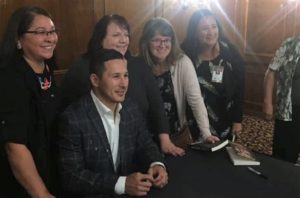Retired NHL right winger Jordin Tootoo inspires Indigenous community in London

By Shirley Honyust/ Yenatli:yo
LONDON— In late September, an audience gathered to hear Jordin Tootoo, retired right winger with National Hockey League (NHL) club the Chicago Blackhawks, speak about his career and life experiences as the first player of Inuk descent to suit up in the NHL.
The speaking engagement was at the 13th Annual Fundraising Breakfast held on behalf of Addictions Recovery Services in London with proceeds to services and programs offered locally. The Doubletree Hotel conference room was packed to capacity with standing room only and the audience listened on as a local drum played an honour song as Tootoo advanced to the podium.
As a youth, Tootoo remembers having lots of everything, but still, he lived in fear; he vividly remembers being yelled at and constantly told he was not good enough. He followed his brother Terence into the world of hockey and together they made history, becoming known as Team Tootoo.
Just before playing with the New Jersey Devils, during the last week of August in 2012, Terence took his own life. His body was found the following day by police search dogs and not long after that, Jordin was drafted to the Nashville Predators.
After the loss of his brother, Jordin experienced shock, denial, anger and blame. Though the cycle found him with lots of money, working seven days a week, he still felt very much alone. Through seeking professional help, he learned that he needed to change, forgive and to heal. Returning to the land, connecting with that place of hope and honesty, he found his self worth and a place of healing. The Elders he consulted with advised him to “Explore the world— home is always where you go. Be selfish and look after yourself”.
Jordin has met many people and has had many opportunities in his life and learned that “choices and consequences are up to you. At the end of the day it is up to you to look in the mirror.”
Even as a retiree, Jordin is still up early every day. He does not know one person who has not been affected by issues of mental health, addictions or suicide. Jordin finished his keynote speech with a question and answer period.
When asked what he told himself as he was navigating through the trauma, his response was simple, yet powerful.
“To use self-motivation, to make right choices, to believe in myself, to prove everyone wrong, that he is good enough. To use what comes from within, and to value relatives and close friends.”
Time was then scheduled for a meet and greet with the Indigenous community—adults and teens—as everyone lined up for book signing and a personal few words with this remarkable person.


